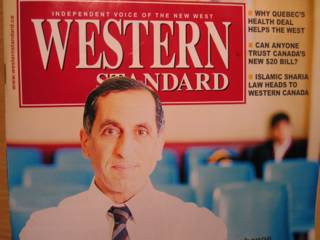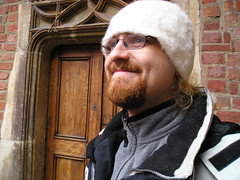One of my more memorable reads when I was in highschool was Salinger's 'Catcher in the Rye.' I bet it's probably a memorable book for you, too, since we all had to read it. I admit I haven't picked it up since, and so my recollection and evaluation of it is based on what I thought of it then. I'm sure, if I read it again, it wouldn't impact me as much as it did then. I guess I've moved on, and I'm sure I would have plenty of negative things to say about it.
But then you get a phony like
this guy who
shits all over Caulfield for being a paradigm case of the kid-in-transition, and on Salinger for having written the book. As if Salinger brought it about that the book sells as well as it does, or appeals to as many people (like me) as it does.
The part of the novel that really stuck with me was when Caulfield went to visit his sister in her school and spotted a "fuck you" scrawled on one of the walls. He starts to rub it off, but realizes that people might think that he had gone ahead and scribbled it there himself. So he stops. But he thinks about how people write things like that, and becomes certain that, after he dies, someone is bound to run up to his gravestone and write "fuck you" on it.
This critique reminds me of that a bit. There's a certain pleasure in writing fuck you all over the things other people find sacred, profound, or inspirational, that you think is lousy. Like Dr. Phil--he's the butt of all sorts of wrath. Same with Oprah. And never mind religions of all sorts (part of what I like about Nietzsche was his insistence on the stupidity and immorality of Christianity. His depiction of it as a 'slave morality' kept me up at nights. It helps, of course, that I was reading Nietzsche on the heels of Ayn Rand, who thinks of altruism in just those sorts of ways--the altruist as sacrificial animal. Anyways...). Few things should be taboo, and I don't mind people tearing at old men to see if they stand up after the clawing. But there's something profane about taking Salinger to task because everyone else seems to think his novel is the greatest this or that.
For my part, I loved the novel. I thought Caulfield was frustrated in a way that I was frustrated. I thought his shallow and unreflective accusations of universal phoniness (the football jocks, the parents, adults in general), were less an accurate portrayal than they were a generalised worry about the way things are. It's like sitting in a church pew and, for the first time, hearing the priest's sermon as Mother Goose and Grim stories, rather than as profound tales grounded in truth. What do you do with a moment like that? Don't you look around at all the nodding heads and think, "what the fuck is going on here?"
Alina tells me that she wonders why people prefer, or are more consumed by, positional goods than they are material goods. Caulfield's 'phoniness' is an expression of just that sort of wonder. And when you come close to seeing that that's what matters (and, incidentally, this is a good explanation for the lack of correlation between increases in material goods and 'happiness,' however defined), then, prior to accepting it, you think of it as the biggest, and phoniest sort of bullshit. But then you think, 'es muss sein,' and you carry on.
Or, instead, you see it as the expression of our fundamentally social nature and, viewed in that light, it can become something bordering on wonderful. We care what others think of us, and it reflects in our behaviour. We can either take it in, be consumed by it, and obsess about what others think of us (a negative thing), or we can allow others to form and inform our sense of self and move forward influenced by the things that others know that we don't (a positive thing). We can't know everything, so a presumption in favour of others having some kind of better insight into at least a tiny few things is enough to make us pay attention to their preferences. It's a way of expanding our base of knowledge without having to experience it ourselves. Having more information is better than having less.
He writes:
"Viewed from the vantage point of half a century, the novel raises more questions than it answers [Just a standard cliche way of beginning a critique. What the hell sort of questions is a novel like this supposed to answer anyways? It's not a textbook]
. Why is a book about a spoiled rich kid kicked out of a fancy prep school so widely read by ordinary Americans, the overwhelming majority of whom have limited means and attend, or attended, public schools? [You just answered the question about its success--its wide appeal. Here's a novel about a rich kid, and here I am, in a public Catholic highschool thinking, 'Jesus, this Caulfield kid is sort of like me,' for Chrissake.]
Why is Holden Caulfield nearly universally seen as "a symbol of purity and sensitivity" (as "The Oxford Companion to American Literature" puts it) when he's merely self-regarding and callow? Why do English teachers, whose responsibility is to teach good writing, repeatedly and reflexively require students to read a book as badly written as this one?"
The guy obviously doesn't walk on water, but what's the point of expecting something like that anyways? He's no Fitzgerald as a writer. He sits somewhere between a Steinbeck and a Vonnegut, I'd say. And this fellow's deconstruction of the novel, interspersed with lines like:
"This just about made me puke", is as callow as he thinks Caulfield is.
He complains about all the buttons the book pushes. All the cliched ways in which a book or movie elicits feelings of sympathy, empathy, hatred, contempt, and so on. "
From first page to last," he writes, "
'The Catcher in the Rye' is an exercise in button-pushing, and the biggest button it pushes is the adolescent's uncertainty and insecurity as he or she perches precariously between childhood, which is remembered fondly and wistfully, and adulthood, which is the great phony unknown."
This is the novel's greatest strength--that it pulls on just those levers. And this guy wants you to think it's the biggest sort of nonsense. Then he carries on to say that we didn't have this sort of perilous adolescence until Salinger invented it. Then we had 'Rebel without a cause,' Valley girls, and lots of other crap for kids who 'wistfully recall their childhood' and are faced with becoming responsible. First goes the horse, and
then the cart, reverse it and you don't get anywhere. It isn't as though Salinger invented this moment of crisis, and
then we all started to behave in just those ways. The novel finds this thread and pulls hard on it. And its success in recognizing, not inventing, this moment in our lives accounts for the success of subsequent attempts at getting at this moment as well. Notice, too, that were this true, you wouldn't have a similar appeal for things of that sort in other countries that don't read Salinger like Americans or Canadians do. And in this, there's a hint of "the world ends where the borders of North America (minus Mexico) fall into the oceans." A more honest critique would find this claim easily contradicted by looking at Eastern European adolescents, say, or kids in still other places.
And I hate to point this out, but if the buttons weren't there to push in the first place (i.e. if Salinger invented this sort of adolescence, rather than touched on something pre-existent), then he couldn't have pushed them.





















